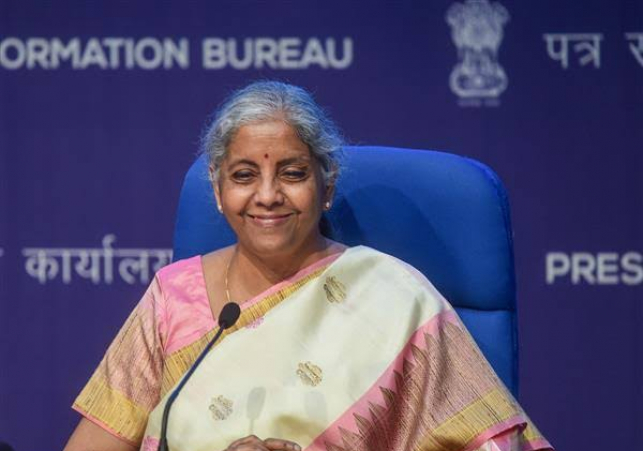

The inclusion of aviation fuel in the GST regime will be discussed by the Finance Minister with the states.
Finance Minister Nirmala Sitharaman said on Sunday that the government will bring the inclusion of Aviation Turbine Fuel (ATF) in the Goods and Services Tax (GST) system before the GST Council, saying that rising global fuel costs are a reason for worry.
Ms. Sitharaman was replying to Spicejet Chairman Ajay Singh’s request that the excise duty on fuel be reduced, at least temporarily, because global crude oil prices are hovering around $90 per barrel, and that ATF be included in the GST regime.
Of course, not only for aeroplanes, but for all of us, the global price of fuel is now a problem. “This is especially true for airlines because the sector has yet to recover from the epidemic,” the Minister stated in a post-Budget discussion organised by industry organisation Assocham.
Ms. Sitharaman noted that the Omicron variant of COVID-19 struck just as the civil aviation sector was on the verge of reviving, with tourists travelling across borders. States have since reintroduced restrictions on domestic travel, and global travel is also impacted by quarantine rules, wreaking havoc on the industry.
She pointed out that the decision to include ATF in GST was not hers alone. “The GST Council will make the decision.” “I’ll put it on the table for them to debate the next time we meet at the Council,” she said, adding that she’ll also talk to banks about the aviation sector’s concerns.
Are you ready for a ‘taper tantrum’?
The economic recovery is undeniable… It may not be consistent across the board, but it certainly noticeable. “I would urge Indian industry to ensure that we don’t miss the bus this time,” the Minister said during a meeting with the Federation of Indian Chambers of Commerce and Industry (FICCI), adding that the country had missed out when the previous government mishandled the “taper tantrum” following the global financial crisis. The Minister, on the other hand, claims that the government and the central bank are on top of the matter this time.
We will be able to firmly state that we are keeping a close eye on global strategic developments, the Federal Reserve’s choices, and worldwide inflationary pressures. We’re keeping a tight eye on everything. And I can promise the leadership here that we will not let the Indian economy suffer as a result of a lack of preparation,” she said, adding that lessons have been learned from previous crises’ blunders.
“Following the global financial crisis, the way in which, for whatever reasons — and I’m not getting into a debate about whether that was right or wrong — but indeed the outcome showed that an opportunity was missed in that the measures taken [at] the time to ensure that liquidity was maintained were insufficient.”
As a result, India has become one of the world’s most vulnerable economies. The taper tantrum wasn’t dealt with properly at all. She said, “We missed up on one significant chance that was available at the time.”
The minister was replying to SpiceJet Founder Ajay Singh’s request for the Union Finance Minister’s cooperation in putting ATF under the GST framework.
Oil is at USD 90 per barrel, the rupee is at 75 to the dollar, and the civil aviation sector is chronically unwell. Your assistance in this process (in bringing ATF into GST) will be immensely beneficial,” Singh stated.
Currently, the federal government imposes an excise tax on ATF, while state governments impose a VAT. With growing oil costs, these taxes, particularly the excise charge, have been raised on a regular basis.
Incorporating oil products under the GST will not only assist businesses in deducting tax spent on inputs, but it will also provide uniformity to the country’s fuel taxation.
“Of course, not just for the airline,” Sitharaman said, “but the worldwide price of fuel is now a problem for all of us, particularly for airlines that have not had a complete head start following the pandemic.”
Also read : The country is expected to grow at 9.27%, Budget 2022